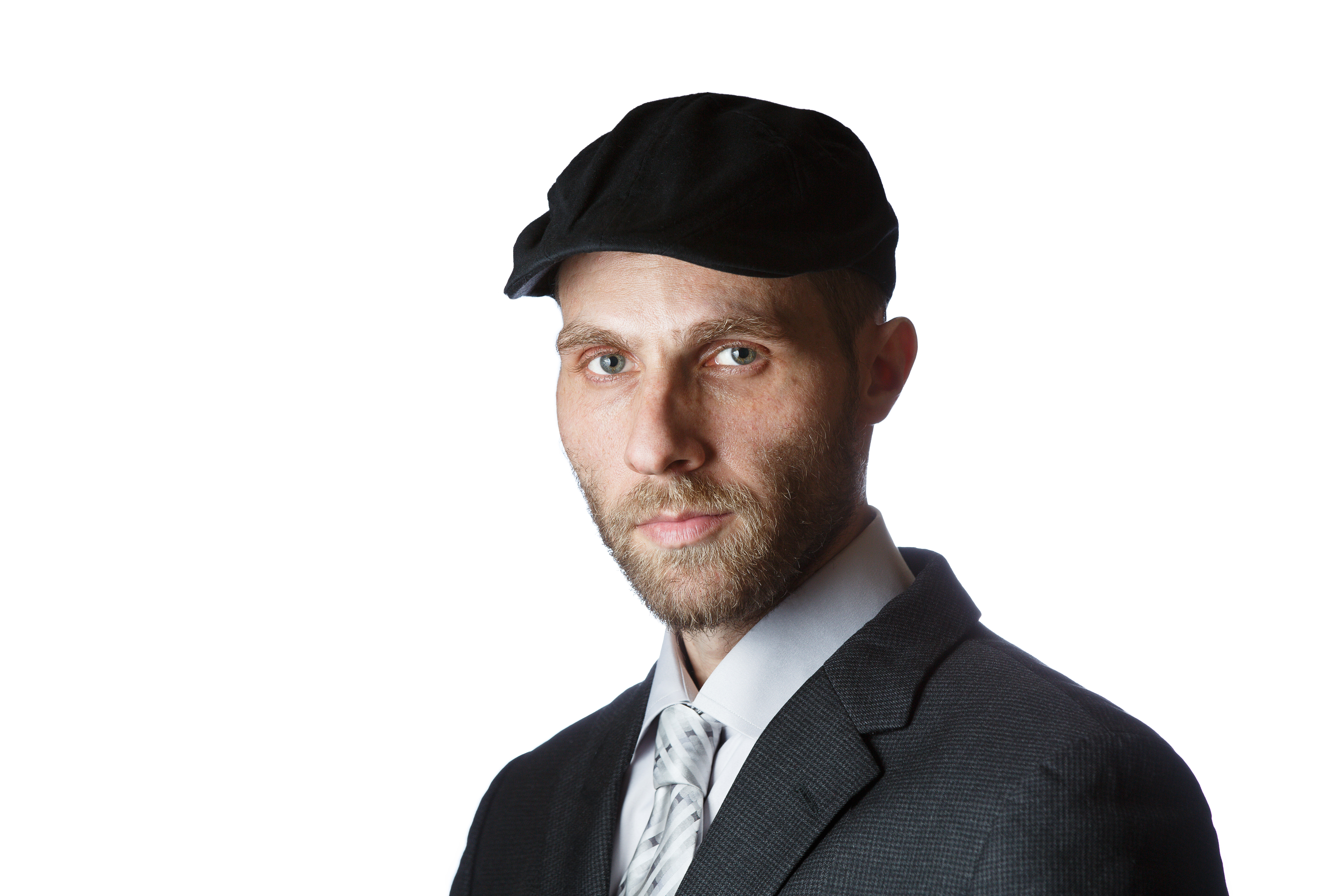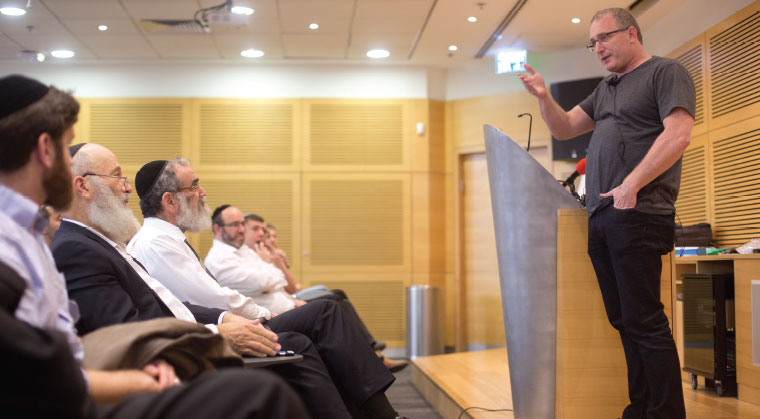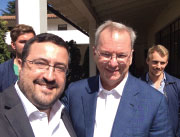Counting the Waze to Success


STRONGER Noam Bardin’s best advice: “Train at a place where they pay you to make mistakes so that you can be stronger when you go out on your own” (Photos: Lior Mizrachi)
I srael Rosenberg the CEO and co-founder of BotBuy met a legend in the tech business last week. “It was important to come to hear him” he said.
The “him” is Noam Bardin the CEO of Waze the tech company that revolutionized driving with its navigation app. Bought by Google in 2013 for approximately $1 billion Waze counts 65 million users worldwide.
Bardin appearing before a chareidi crowd at the Jerusalem headquarters of Cisco in Har Chotzvim wore a T-shirt and casual pants in front of the audience dressed in black and white. He told the story of Waze and how it evolved from a simple experiment in crowdsource social navigation into a worldwide leader in a new field. To make his point when Bardin asked how many in the crowd use Waze nearly everyone raised their hands.
The high turnout and eager audience are evidence of the growing and enthusiastic entry of the chareidi community into Israel’s booming high-tech industry. A live video feed of the presentation was also transmitted to groups in Arad Dimona and the Bedouin Negev town of Hura.
Bardin’s visit was sponsored by KamaTech a coalition of 35 Israeli high-tech companies established in 2014 to facilitate the successful integration of chareidi men and women into the Israeli high-tech workforce.
A couple of months before Bardin’s Jerusalem visit a delegation of chareidi women from KamaTech traveled to Google’s San Francisco headquarters to work on a joint project to develop an Android app in cooperation with the American tech giant. Bardin was so impressed by the delegation that he agreed to invest in a program that supports new chareidi start-ups in Israel.
Eric Schmidt the chairman of Google’s parent Alphabet was similarly impressed according to Moshe Friedman KamaTech’s co-founder who met with Schmidt in San Francisco. “Schmidt told me that innovation comes from diversity and that this is the future for high tech — the inclusion of religious people women and minorities ” Friedman said.

“Innovation comes from diversity and this is the future for high tech — the inclusion of religious people women and minorities.” Eric Schmidt (right) with Kama Tech’s Moshe Friedman
KamaTech which has been operating since 2014 trains and places programmers and maintains connections with major companies in the industry including Google Microsoft and Cisco. The organization also mentors chareidi start-ups with an accelerator program.
Making Their Pitch
At the Jerusalem event attended by some 200 men and women (and another 150 watching live from the three other locations) Friedman called up various chareidi start-up owners to describe their business ideas to Bardin who went on to give tips about succeeding in the industry.
One of the entrepreneurs who presented to Bardin was Rosenberg of BotBuy. The website works like this: users enter written requests for products to purchase. A bot then generates numerous options. Instead of taking time to search on Amazon or go to shops the response is instant.
“You write what you want and we find it like a salesperson” Rosenberg told Mishpacha. BotBuy is one of six companies that participate in the KamaTech accelerator.
In today’s business climate said the Waze CEO when a business sector is changing fast — like online retail or mobile communications — it opens the markets for startups. But this means the startup must move fast to get the product on the market a challenge for startups with limited resources and inexperienced management.
Bardin suggested budding high-tech entrepreneurs will benefit from working for somebody else first — preferably a large enough firm where an amateur mistake won’t sink the project. “Train at a place where they pay you to make mistakes so that you can be stronger when you go out on your own” says Bardin who ironically didn’t follow his own advice. He got his start at Deltathree a company he founded to provide Voice over Internet Protocol (VoIP) telephony services in 1996 while studying for a bachelor’s degree in economics and political science at the Hebrew University in Jerusalem. Bardin also holds a master’s degree in public administration from Harvard University.
Another tip said Bardin is that not every idea is right for a startup model. He recommended not starting something from scratch but adding an innovation to an existing product.
It’s also important for a start-up to have the “ability to focus and do one thing really well” and not grow into too many different areas. Bardin said that groups such as pilots and skiers have approached Waze about mapping for their industries but Waze turned them down. They want their focus to be on driving alone. “Most start-ups fail” he said. “For an app to do more than one thing is a problem since people usually open a specific app for a specific purpose — that does one thing very well.”
A start-up can succeed in one place but not another Bardin said noting that Waze has not taken off in Germany but it has become popular in neighboring France. In Brazil it is the third most popular app but in Argentina it is not generally popular.
How Waze Succeeded During his presentation the Waze CEO retraced key points in the company’s growth. The first significant hurdle came at the end of 2009 when Google Maps beat them to market by introducing their product first. That scared away potential Waze investors who doubted the company could compete with the tech giant.
“You need to build a community to get investors” Bardin said.
However Bardin emphasized to the chareidi entrepreneurs that Waze had a secret weapon called innovation. “Everyone doing something interesting is competing with the big companies” he said. Additionally he pointed out that in fact Waze was not competing against Google but only the specific Google Maps team.
Waze met with users during early development to figure out why the product wasn’t growing. The company developed a list of 12 things they needed to fix to improve user retention which in the early days was only around 8 percent. The company stressed the importance of building a community of users that could communicate and see each other. Seeing others using the program also boosts retention.
“It is critical to remember that if there is no organic growth — 80 percent of growth needs to come from the product — without this any amount of money won’t help.”
“Our backup plan was to sell data” he revealed. “We have sold maps to some big companies.”
Bardin also discussed the unique advantage that Waze has over its owner’s program Google Maps. Waze uses different maps and includes much more traffic data. Asked why Waze and Google Maps do not join to form one program he argued that it would require a huge effort and there would be little benefit.
Furthermore continued Bardin “Waze is emotional as many users talk about what Waze ‘did to me’ or ‘it took me here.’ When you build a product for consumers sometimes the emotional connection is more important than the technology.”
He explained that “it is a statement about the brand and it is different from Google Maps. People don’t talk about Google this way.”
The Transportation Revolution Bardin foresees a coming transportation revolution in which getting from one place to another will be seen primarily as a service that can be accomplished in any number of ways. There will be self-driving cars more efficient carpooling and improved public transportation. What’s more with a push of a button on your phone users will be able to choose a method of travel while viewing the cost and duration of each option.
“There is enough transportation infrastructure in the West and there is a need to take advantage of it” he said.
The group in Hura asked Bardin why certain roads and villages in the Negev do not appear on the Waze map. The CEO responded that this can easily be changed by going on the app and entering the data. “If nobody goes there and nobody cares about the place it won’t appear. People in the field know better than us.”
In this way Waze depends on input from users not only for the map but also for real-time updates such as accidents traffic jams and road closures.
“Big companies don’t have active communities” he added going on to mention that Waze has active communities in various countries throughout the world including Saudi Arabia Iran Brazil and the Philippines.
Asked about mistakes Waze had made the CEO recalled how when Google came out with its mapping program Waze became anxious and changed its direction. The message to learn from this is: “Don’t be scared of the big companies. Your competition is not the big companies but yourself.”
Oops! We could not locate your form.







